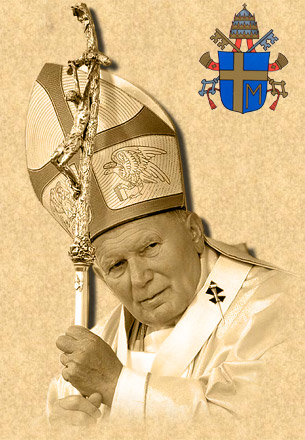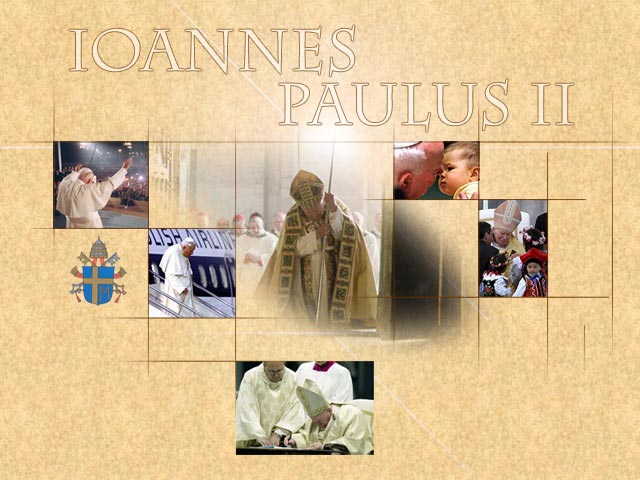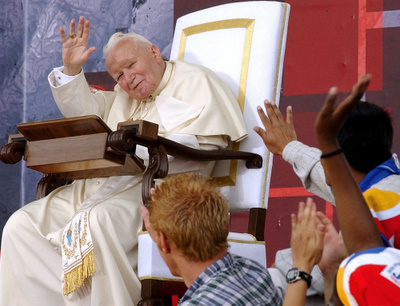The spiritual exercises in the Jubilee Year 2000
(12-18 March)
[for the Testament]
1. When, on 16 October 1978, the Conclave of Cardinals chose John Paul II, Cardinal Stefan Wyszynski, the Primate of Poland, said to me: "The task of the new Pope will be to lead the Church into the Third Millennium". I do not know if I am repeating the sentence exactly as he said it, but this was at least the sense of what I heard him say at the time. These words were spoken by the Man who went down in history as the Primate of the Millennium: a great Primate. I witnessed his mission, his total confidence, his struggles and his triumph. "When victory is won, it will be a victory through Mary": The Primate of the Millennium was fond of repeating these words of his Predecessor, Cardinal August Hlond.
Thus, I was in some way prepared for the task presented to me on that day, 16 October 1978. As I write these words, the Great Jubilee of the Year 2000 is already a reality that is taking place. On the night of 24 December 1999 the symbolic Great Jubilee Door in the Basilica of St Peter was opened, and subsequently that of St John Lateran, then that of St Mary Major - on New Year's Day, and on 19 January the Door of the Basilica of St Paul "Outside-the-Walls". Particularly the latter event, because of its ecumenical character, was imprinted indelibly on memories.
2. As the Great Jubilee of the Year 2000 continues, the 20th century closes behind us and the 21st century unfolds, from one day to the next. In accordance with the designs of Providence, I have been granted to live in the difficult century that is retreating into the past, and now in the year in which I have reached my 80s ("octogesima adveniens"), I must ask myself whether the time has come to say with Simeon of the Bible, "Nunc dimittis".
On 13 May 1981, the day of the attack on the Pope during the General Audience in St Peter's Square, Divine Providence miraculously saved me from death. He Himself, who is the One Lord of life and death, extended this life of mine, and in a certain way he restored it to me. Ever since that moment it has belonged even more to Him. I hope He will help me to recognize how long I must continue this service to which he called me on 16 October 1978. I ask him to deign to call me to Himself whenever he wishes. "If we live, we live to the Lord, and if we die, we die to the Lord; so then... we are the Lord's" (cf. Rom 14: 8). I hope that as long as I am granted to carry out the Petrine service in the Church, God in His Mercy will grant me the necessary strength for this service.
3. As I do every year during the spiritual exercises, I read the Testament that I wrote on 6 March 1979. I continue to keep the instructions it contains. What was added then, and also during the subsequent spiritual retreats, reflects the difficult and tense general situation that marked the 1980s. After autumn of the year 1989, this situation changed. The final decade of the last century was free of the previous tensions; this does not mean that it did not bring new problems and difficulties. In a special way may Divine Providence be praised for this, that the period known as the "Cold War" ended without violent nuclear conflict; the risk of it had been threatening the world in the previous period.
4. As I stand on the threshold of the Third Millennium "in medio Ecclesiae", I would like once again to express my gratitude to the Holy Spirit for the great gift of the Second Vatican Council, to which, together with the whole Church - and especially with the whole Episcopate - I feel indebted. I am convinced that it will long be granted to the new generations to draw from the treasures that this 20th-century Council has lavished upon us. As a Bishop who took part in the Council from the first to the last day, I desire to entrust this great patrimony to all who are and will be called in the future to put it into practice. For my part, I thank the eternal Pastor who has enabled me to serve this very great cause in the course of all the years of my Pontificate.
"In medio Ecclesiae"... from the very first years of my service as a Bishop - precisely, thanks to the Council - I was granted to experience the fraternal communion of the Episcopate. As a priest of the Archdiocese of Krakow, I was granted to experience the fraternal communion of the presbyterate - the Council had opened a new dimension of this experience.
5. How many people I would have to list! The Lord God has probably called the majority of them to Himself - as for those who are still here, may the words of this Testament recall them, everyone and everywhere, wherever they may happen to be.
In the course of the more than 20 years since I have been carrying out the Petrine service "in medio Ecclesiae", I have experienced the benevolent and most especially the fruitful collaboration of so many Cardinals, Archbishops and Bishops, so many priests and so many consecrated persons - Brothers and Sisters - finally, of a great many lay people, in the Curial environment and in the Vicariate of the Diocese of Rome as well as outside these contexts.
How could I not embrace with grateful memories all the Episcopal Conferences in the world, which I met in the course of their visits ad limina Apostolorum! Besides, how could I fail to remember all the Christian Brothers and Sisters - non-Catholics! And the Rabbi of Rome and likewise all the representatives of non-Christian religions, not to mention all the representatives of the worlds of culture, science, politics and the media!
6. As the end of my earthly life draws close, I think back to its beginning, to my Parents, my Brother and my Sister (whom I never knew, for she died before I was born), to the Parish of Wadowice where I was baptized, to that city of my youth, to my peers, my companions of both sexes at elementary school, at high school, at university, until the time of the Occupation when I worked as a labourer, and later, to the Parish in Niegowic, to St Florian's Parish in Krakow, to the pastoral work of academics, to the context... to all the contexts... to Krakow and to Rome... to the persons who were especially entrusted to me by the Lord.
I want to say just one thing to them all: "May God reward you!".
"In manus Tuas, Domine, commendo spiritum meum".
17 March 2000, A.D.




